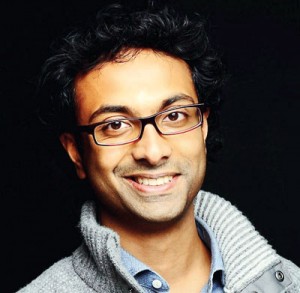The stories he heard in Rwanda had to be told
View(s): The legend goes that at twenty-two, just out of university, Anjan Sundaram decided to go to the most forbidding place in the world and learn to become a journalist there. The book he wrote about the experience – Stringer – is an account of a year and a half that Sundaram spent in the country.
The legend goes that at twenty-two, just out of university, Anjan Sundaram decided to go to the most forbidding place in the world and learn to become a journalist there. The book he wrote about the experience – Stringer – is an account of a year and a half that Sundaram spent in the country.
It was an intense period that would take him deep into Kinshasa, to the dense rainforests that still evoke Conrad’s vision, and to the heart of Africa’s great war, culminating in the historic and violent multi-party elections of 2006. Along the way he would go on a joyride with Kinshasa’s feral children, fend off its women desperate for an escape route and travel with an Indian businessman hunting for his fortune.
He found inspiration for his next book, even as he was quite literally writing his first. Sundaram had chosen to go to Rwanda in 2009, a place he thought would be quiet and conducive to hammering out his experiences in the Congo. “I thought the country was peaceful, even a little boring, a great place to write a book,” he told journalists.
He began to teach local journalists as a way to make some money and also engage with local society, but very quickly, he learnt that media there were living and working in a climate of great repression. “One of them had been beaten into a coma, after bringing up the harassment of the press in front of President Kagame of Rwanda. Another young woman had been in prison for many years and physically and psychologically abused, she was sick with HIV.” Hearing these stories shocked Sundaram, even as he became aware that there was an essential story here, waiting to be told.
“The predominant sense one gets living in a dictatorship is of betrayal. Everything betrays you. Everyone you know can betray you. Friends betray you. Your very senses betray you. What you see as peace you realize is a silence that is created by fear. And so all your first impressions at some point are betrayed and it creates a feeling of terror when you can’t trust anything or anyone and that’s really the sense that I try to portray in the book.” He wrote about Rwanda in ‘Bad News: Last Journalists in a Dictatorship’ (2016)
A graduate of Yale, where he studied Mathematics, Sundaram’s first book ‘Stringer: A Reporter’s Journey in the Congo’ became a Royal African Society Book of the Year.An award-winning journalist, he has reported from Central Africa for the New York Times and the Associated Press. His writing has also appeared in Granta, The Guardian, Observer, Foreign Policy, Politico, Telegraph and The Washington Post.

His war correspondence from the Central African Republic won a Frontline Club award in 2015, and his reporting on Pygmy tribes in Congo’s rainforests won a Reuters prize in 2006. His work has also been shortlisted for the Prix Bayeux and the Kurt Schork Award. Reporting from the Congo, he spoke about all the stories waiting to be told: “When I found the job there as the AP journalist, I became one of four international reporters in a country half the size of Europe.”
He says his studies in mathematics have continued to influence his approach to writing: “Abstract algebra resembles writing in that it is a creative field. In algebra,you build mathematical objects. You also try to show that seemingly different objects are the same. You try to see the world in a different way. This is the essence of what I enjoy about writing.”
His experiences as a young journalist have shaped his world view. “I don’t think I see violence as something so distant anymore. It’s easy to dismiss Congo and Africa as this distant place, with people living in exceptional conditions that don’t matter much to us. I think you lose those perspectives and the simplicities that go along with that kind of thinking, when you’ve lived in a place like Congo for some length of time.”


